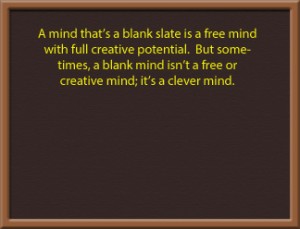By Cathy Eck
Mind Goes Blank
Recently, I received a great question. After letting go of a whole string of beliefs, this person’s mind went completely blank — quiet. She wondered if this was her True Self, or was it just a false self trick?
On the journey to freedom, we often have moments of peace and calmness where our True Self is in power. Other times our false triggers beliefs so that our mind goes blank. If we pay close attention, we can discriminate between a quiet True Self and a mind that is holding on by pretending to be blank.
Our True Self is naturally quiet; it’s also unemotional — it’s congruent. When our false mind goes blank, there isn’t peace in our body — our body and mind are incongruent. That’s how you know the difference.
When my mind goes blank, I just turn my attention to my body; and my emotions guide me to the causal belief. Emotions guarantee that our false self can’t hide for long — that’s a good thing.
If you’re in touch with your emotions, turning to your body will get you back on the freedom train. If you don’t feel emotions or your emotions are blocked on a particular subject, try any of these tips.
Clone Mind
Most westerners have a True Self clone mind. It’s a part of our persona that is a highly convincing copy of a True Self. We fall for cult leaders, politicians, gurus, priests, and salesmen who have convincing clone minds because they appear spiritual, Jesus-like, or really good. Clone minds come from a strong desire to be seen as good — to be loved and approved of. The clone mind is distanced from its thoughts — it pays attention only to actions. It is completely outer directed, and constantly managing perceptions in extreme cases. Many people with True Self clone mind don’t even think they have beliefs; they’re sure their mind is filled with the truth.
When the false self feels threatened, often triggered by a big letting go spree, clone mind steps in to save the day. It’s goal is to convince us that we’re already there — no need to let go. If you’ve been a meditator or were taught that good kids are seen and not heard, your clone mind might be very quiet and behave much like your True Self. But you can call it on its game.
Here’s the key. You don’t notice that your True Self is quiet except in hindsight after it gets noisy again. If you’re thinking, “Great, my mind is quiet. I’m spiritual.” Then your false self is probably cloning your True Self.
Up the Ante
Our mind goes blank when we’re in apathy, but we believe that we’re in acceptance. If we set our desires very low, we keep apathy at bay. If your only desire is to sleep and eat, and you’ve got that down, you won’t feel much emotion. Your beliefs happily run your show and everything is in your false mind’s control.
Apathy resists change. Apathy also causes jealousy and envy when others fulfill desires that we pushed aside. People in apathy tend to say things like, “I accept where I am,” or “I accept what God gives me,” or the Catholic motto, “I’m happy even though I’m suffering.” Real acceptance doesn’t produce unfulfilled desires or longing. Apathy is always the product of beliefs that we accepted from a very savvy clone mind.
If you find that your mind goes blank and you suspect apathy, create a desire. As soon as you launch even a little desire, your false mind (or the voice of the clone mind) will start to send a flurry of reasons why you can’t have what you want. If you can’t see your limiting beliefs, your friends and family will happily bring up some jealousy or envy. Now your mind isn’t blank anymore.
You Can’t See Me, Hear Me, or Feel Me
The false mind loves to play Hide ‘n Seek. The false mind goes blank because there’s a belief that is active, but you don’t identify with it. The mind pretends that the thought is out there, and you have no power over it. However, you can recognize that it’s in your mind because you feel emotion when the other person says it. Our emotions relate to our thoughts, not the thoughts of others regardless of who speaks them.
When your mind goes blank, think about your latest disagreement. Ask yourself, “What bothered you in the other’s words or actions?” You’ll feel emotion. That’s because you believed what they said. You don’t want to believe them, but you do. The emotion is saying that what you’re thinking right now isn’t true, so let it go. If you truly don’t believe another, you won’t be bothered by their beliefs. But you can’t fake this. You have to really get that the belief is false and powerless.
Unemotional-looking people often identify all their bad or wrong thoughts with others. They think they’re keeping the thoughts away, but they’re actually keeping themselves trapped in the illusion. Our beliefs about others are still our beliefs. Good trick huh!
This usually happens when we feel certain that our Clone Mind is right or good and our opponent’s point of view is bad or evil. Because we don’t connect the two thoughts as coming from our own mind, we associate the emotion with the other person instead of our own false thinking. The Triangle Process helps to solve this problem.
What Won’t You Do
The last trick involves challenging your rulebook when your mind goes blank. Our mind often gets quiet when we won’t break our own rules. So break a rule — do something you label bad or wrong, like eating candy or watching the Kardashians. Don’t worry, your True Self won’t murder or harm anyone. That will get your mind thinking again. You’ll have plenty of material to let go.
